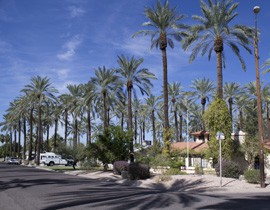Cronkite News has moved to a new home at cronkitenews.azpbs.org. Use this site to search archives from 2011 to May 2015. You can search the new site for current stories.
Feds turn down request to classify Phoenix palm trees as threatened
WASHINGTON – The federal government on Tuesday rejected a request from an Arcadia-area homeowners association to classify the neighborhood’s black sphinx date palm trees as endangered.
The U.S. Fish and Wildlife Service determined that there was not sufficient scientific evidence to classify the trees as endangered, according to the notice published in Tuesday’s Federal Register.
Jeff Humphrey, a spokesman for the agency, said that because the trees are cultivars, they cannot be protected by the Endangered Species Act. A cultivar is a plant, bred for specific qualities, that cannot reproduce on its own, he said.
“If man went away today, this tree would be able to survive this generation, but that’s it,” Humphrey said. “It needs man to survive.”
Mountgrove Property Owners Association President Richard Malone had sought the protection in July 2011, when the association was feuding with the Salt River Project over the utility’s plan to remove or relocate 55 trees to protect power lines.
Residents had challenged the SRP plan because the trees are such an important part of the neighborhood’s culture, Malone said. The roughly 450 towering trees were part of a grove planted in the area before homes were built there.
But Malone said he was actually happy his application was turned down by the Fish and Wildlife Service because of the restrictions it could have brought. Humphrey said protection could have led to limits on residents’ use of the trees, including the current practice of buying and selling their fruit.
“I was not aware of that at first,” Malone said. “I didn’t know the stipulations that were going to be put on the homeowners and the trees.”
The application became moot recently when the homeowners association reached what Malone called a “satisfactory” agreement with SRP. The utility company agreed to remove a handful of the trees, move some and trim others periodically.
Malone said at least one resident makes a living by harvesting dates from the trees, under agreements with his neighbors to share some of the fruit or some of the profits from their sale. That would be prohibited if the trees were listed under the Endangered Species Act, so Malone said he was “happy with that outcome.”
Not everyone makes a lot of money off the trees’ fruit, but Malone said many of the roughly 60 households in the community do sell the fruit that he described as “very delicate, very large and very sweet.”
“It’s the premier gourmet date,” he said.








